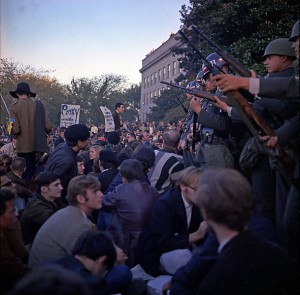War, What Is It Good For?
by Heather Pringle
November 14, 2008
 All this morning, I’ve had Edwin Starr’s great soul tune, “War,†playing in my mind.  In 1970, Starr recorded the song in just one take as a protest against the carnage of the Vietnam War. Indeed, he brought so much intensity into the studio that day that he and his background singers practically roared out the lyrics – “War what is it good for/Absolutely nothingâ€â€”and the song swiftly became an anthem for a generation occupying campus offices and planning sit-ins and demonstrations.
All this morning, I’ve had Edwin Starr’s great soul tune, “War,†playing in my mind.  In 1970, Starr recorded the song in just one take as a protest against the carnage of the Vietnam War. Indeed, he brought so much intensity into the studio that day that he and his background singers practically roared out the lyrics – “War what is it good for/Absolutely nothingâ€â€”and the song swiftly became an anthem for a generation occupying campus offices and planning sit-ins and demonstrations.
What started me thinking about Starr’s hit song was a provocative New Scientist article I read this week on the evolutionary origins of warfare. The writer Bob Holmes recently attended a conference on warfare and human evolution at the University of Oregon in Eugene. According to Holmes, the researchers there–who ranged from archaeologists and anthropologists to primatologists and psychologists—reached an important consensus. “Not only is war as ancient as humankind,†Holmes concluded, “but it has played an integral role in our evolution.â€
This might not strike you as a big news flash. But it represents a major departure from scientific thinking in the not-too-distant past—particularly in the field of archaeology.  For decades, researchers working in the Americas were in a state of denial about the prevalence of ancient warfare. They viewed the Maya largely as peaceful astronomer-priests,  the prehistoric Pueblo people as tranquility-loving architects, and Great Plains bison-hunters as harmonious societies who only engaged in warfare after the arrival of the Europeans.
I think many archaeologists were reacting at the time—consciously or unconsciously—to the old stereotypes of Native Americans as bloodthirsty savages.  By the 1990s, however, the evidence of prehistoric warfare across the Americas was simply too great to ignore—from the slaughter at the 13th century pueblo of Sand Canyon in Colorado, to the massive body count at the South Dakota site of Crow Creek. There archaeologists unearthed a mass grave lined with the skeletons of more than 500 individuals—men, women and children— massacred, maimed and scalped during a deadly raid in the early 14th century.  Ancient Native Americans clearly had their own history of violence.
Current studies suggest that at least ten percent of all male deaths among modern hunters and gatherers can be chalked up to warfare. But why have humans found the call of battle so irresistible? Is there any possible upside? Some researchers attending the conference last month in Oregon put forward a controversial theory. Research shows that most prehistoric warfare takes the form of brief raids conducted by war parties. And these raids would have required men—the primary aggressors—to cooperate and coordinate with one another in order to claim victory.  Such skills would have stood the victors in good stead; in fact, they may even have given rise to our modern ability to collaborate and work towards a common goal.
Maybe songwriter Edwin Starr had it just a little wrong. Maybe humankind has learned at least one important thing from a long and bloody past.Â
This entry was posted by Heather Pringle on
Friday, November 14, 2008.
Discussion of this blog entry is now closed.
Comments posted here do not represent the views or policies of the Archaeological Institute of America.

